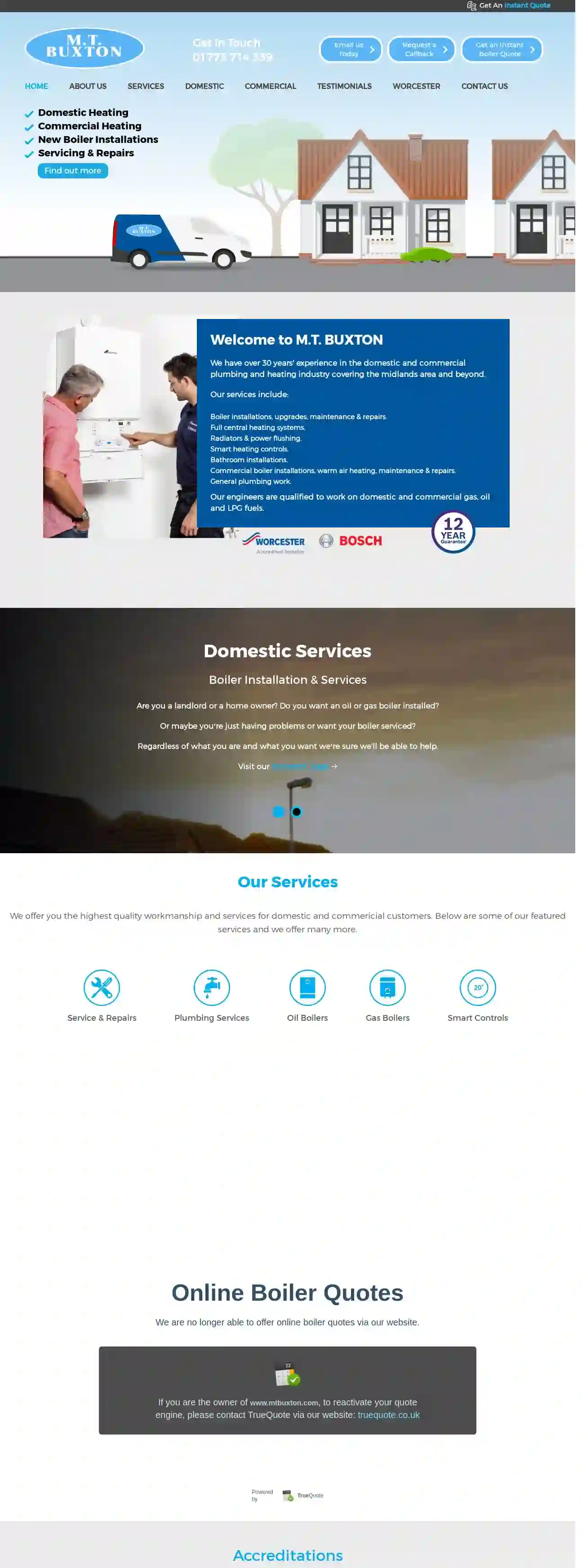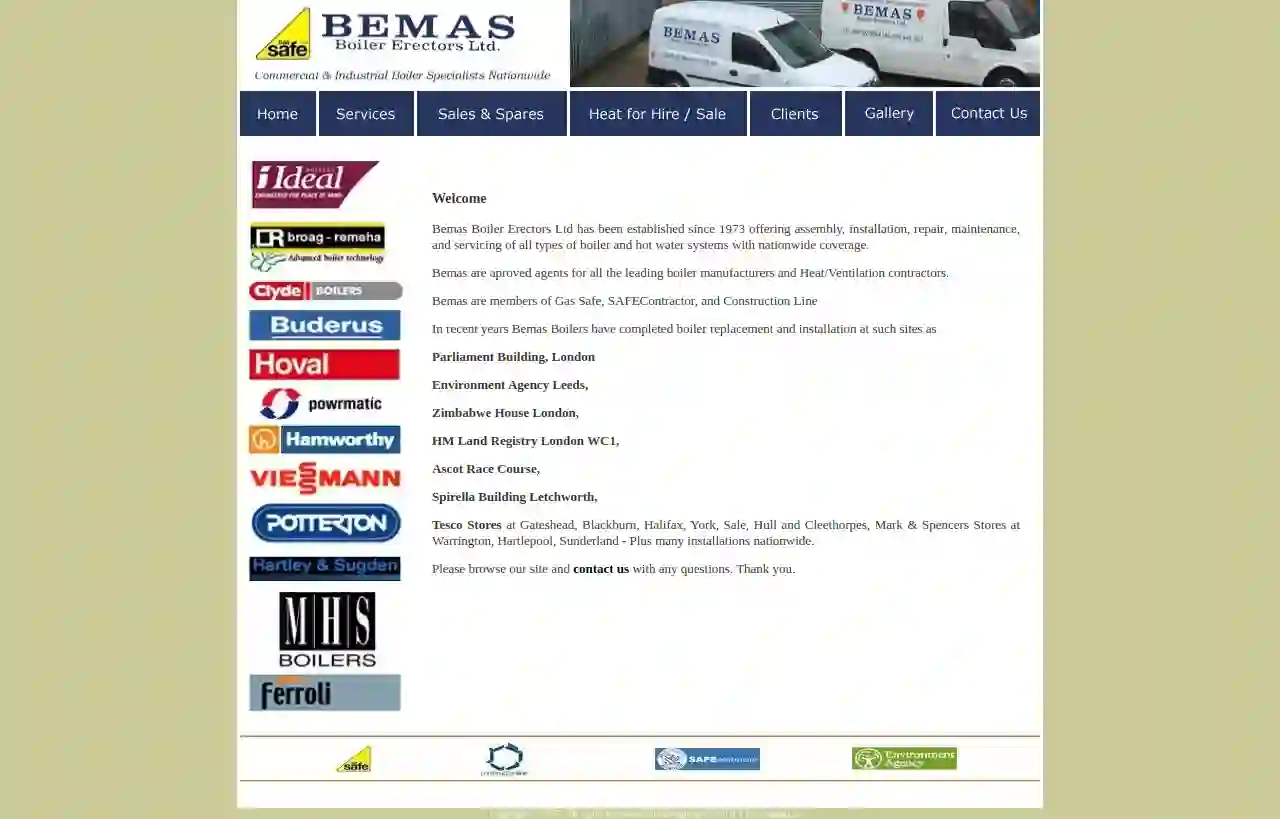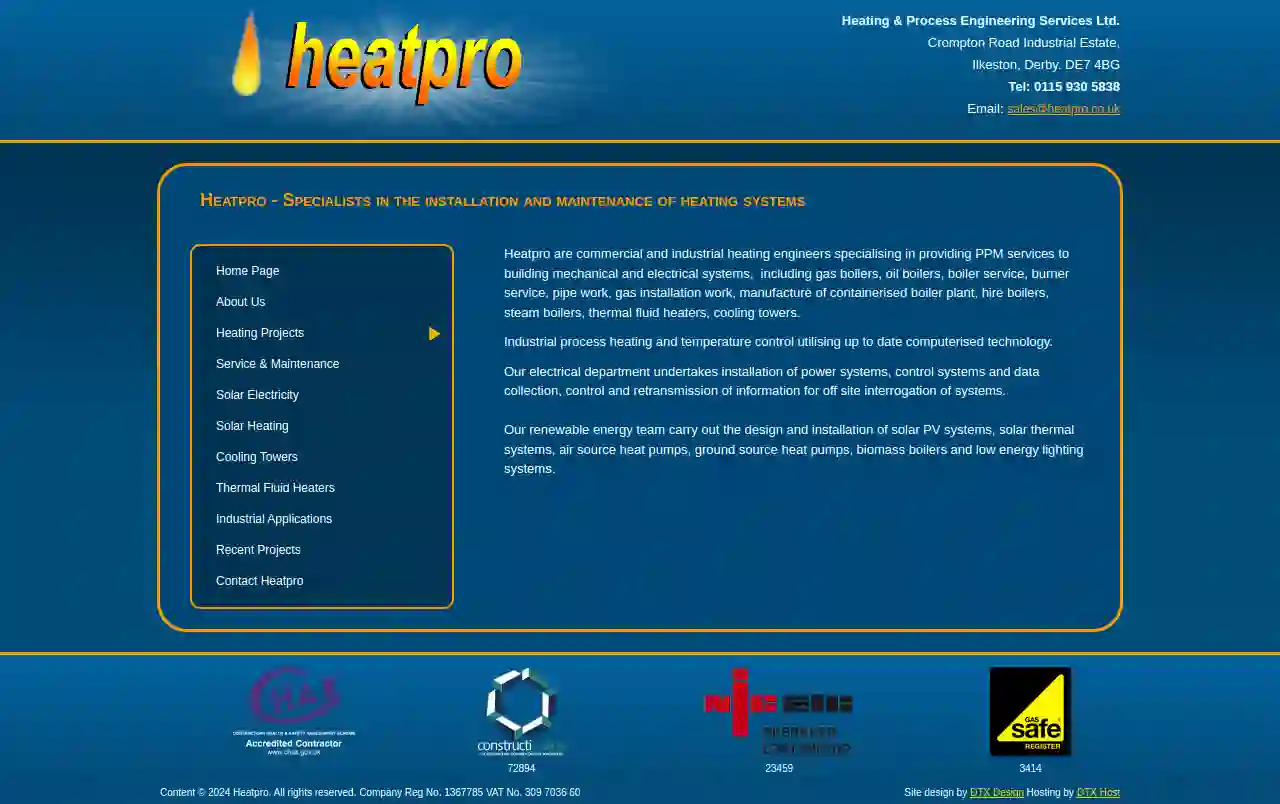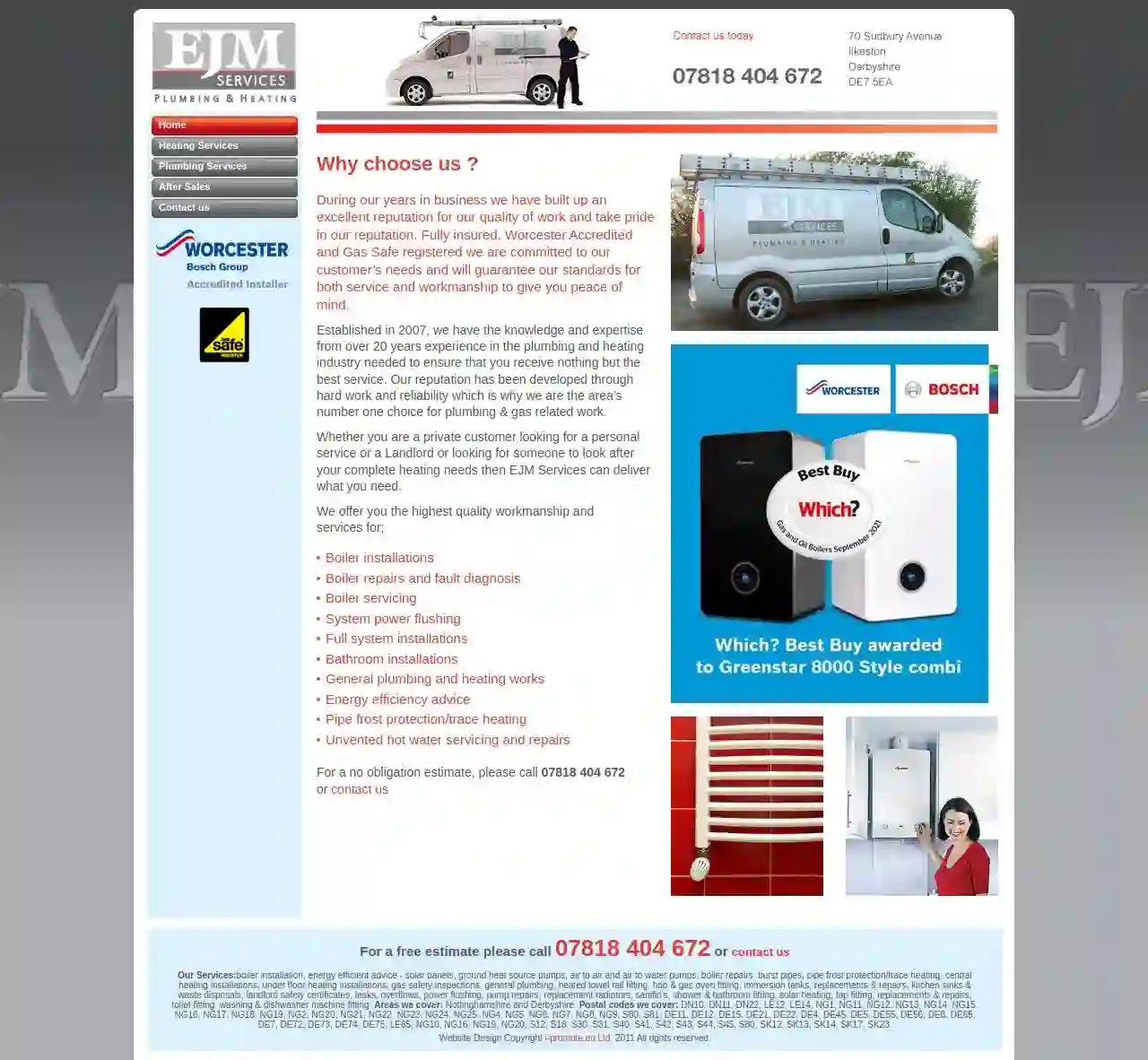HVAC Companies Blackwell
Best HVAC Companies in Blackwell
Receive multiple Heating and Cooling Services quotes for your project today! Compare profiles, reviews, accreditations, portfolio, etc... and choose the best offer.

Trane UK
51 reviewsSwadlincote, GBTrane is a leading global provider of indoor comfort solutions and services. Our innovative products and services help buildings and processes work more efficiently, sustainably, and effectively. With a portfolio of energy-efficient HVAC systems, rental solutions, and services, we help customers achieve their goals and reduce their environmental impact. Our solutions are designed to meet the unique needs of various industries, including office buildings, data centers, healthcare, hospitality, chemicals and pharmaceuticals, retail, food and beverage, and district heating and cooling.
- Services
- Why Us?
- Gallery
Get Quote
M T Buxton Plumbing & Heating
423 reviewsLangley Mill, 237-241 Station Road, Nottingham, NG16 4AD, GBM.T. Buxton Plumbing & Heating is a company with a structured management team which has a wealth of experience on a variety of domestic and commercial work. We have a solid client base reflecting the twenty four years the company has been in existence and as any reliable contractor we are always seeking to expand and develop. Our client list currently includes the Co-Operative Group, Sandicliffe Motors and Repton School to name just a few. We are confident and well able to meet the demands in providing both quality and competitive quotations for a wide spectrum of domestic and commercial work. We are adequately staffed to handle a wide range of contracts from domestic works up to the multi-disciplined service installations associated with larger projects. The company's Senior management, and the assigned contracts engineer, closely monitor the installations to maintain our high standard of workmanship, working closely with all of our directly employed labour force. Our company strategy pursues contracts throughout the UK which would include installation work, planned and reactive maintenance. We trust this proves of sufficient interest and we would welcome any enquires either by our contact page.
- Services
- Why Us?
- Accreditations
- Gallery
Get Quote
Complete Cooling Services Ltd
524 reviewsUnit 4a, Huss's Lane, Long Eaton, NG10 1G, GBComplete Cooling Services is a local HVAC engineers company providing the best services for heating, ventilation & air conditioning. With over 107 years of combined industry experience and knowledge, our team of highly trained and skilled HVAC engineers deliver exceptional services. We provide a seamless and reliable service when it comes to your HVAC systems installation, maintenance and repairs. Our services include air conditioning installation, repairs, service & maintenance, planned preventative maintenance, and more. We are a local company dedicated to ensuring that all of our customers get the very best service and support when it comes to their air conditioning and comfort cooling requirements.
- Services
- Why Us?
- Our Team
- Gallery
Get Quote
Richmond Air Conditioning Ltd
4.610 reviewsDerby, GBRichmond Air Conditioning Limited is a refrigeration and air conditioning specialist providing quality AC installations, maintenance, and repairs throughout Derby, Nottingham, and Leicester. With over 30 years of experience, our team of local air conditioning professionals is dedicated to ensuring your systems run smoothly and efficiently. Whether you're looking for cooling solutions for your office, home, or any other space, we have the expertise and equipment to meet your requirements.
- Services
- Why Us?
- Gallery
Get Quote
Bemas Boilers Ltd
Cilfton Avenue, Long Eaton, NG10 2GA, GBBemas Boiler Erectors Ltd has been established since 1973 offering assembly, installation, repair, maintenance, and servicing of all types of boiler and hot water systems with nationwide coverage. Bemas are approved agents for all the leading boiler manufacturers and Heat/Ventilation contractors. Bemas are members of Gas Safe, SAFEContractor, and Construction Line. In recent years Bemas Boilers have completed boiler replacement and installation at such sites as Parliament Building, London, Environment Agency Leeds, Zimbabwe House London, HM Land Registry London WC1, Ascot Race Course, Spirella Building Letchworth, Tesco Stores at Gateshead, Blackburn, Halifax, York, Sale, Hull and Cleethorpes, Mark & Spencers Stores at Warrington, Hartlepool, Sunderland - Plus many installations nationwide. Please browse our site and contact us with any questions. Thank you.
- Services
- Why Us?
- Gallery
Get Quote
TitanFlameltd-Glossop
51 reviews175 High St W, Glossop, SK13 8HJ, GBTitan Flameltd is a local plumbing emergency call out service with over 20 years of experience in plumbing and heating. We strive to complete every job with the highest skill and best customer service. Our team of emergency plumbers and heating engineers are available 24/7 to provide fast, reliable solutions. We offer a range of services including appliance installation, bathroom plumbing, emergency plumbing, immersion heaters, kitchen plumbing, outdoor plumbing, tap repair and install, pipe repair, boiler installation and repair, water heater installation and repair, radiator installation and repair, gas line installation and repair, furnace installation and repair, heat pump installation and repair, drain cleaning, plumbing repairs, pipe installation and repair, water treatment, and sewer line repair and replacement. We are available 24/7 and offer quick appointments, fast, efficient services, and expert support when you need it most.
- Services
- Why Us?
- Gallery
Get Quote
Heating & Process Engineering Services Ltd
44 reviewsIlkeston, Derby, Crompton Road Industrial Estate, DE7 4BG, GBHeating & Process Engineering Services Ltd. is a company that specialises in providing PPM services to building mechanical and electrical systems, including gas boilers, oil boilers, boiler service, burner service, pipe work, gas installation work, manufacture of containerised boiler plant, hire boilers, steam boilers, thermal fluid heaters, cooling towers. We also provide industrial process heating and temperature control utilising up to date computerised technology. Our electrical department undertakes installation of power systems, control systems and data collection, control and retransmission of information for off site interrogation of systems. Our renewable energy team carry out the design and installation of solar PV systems, solar thermal systems, air source heat pumps, ground source heat pumps, biomass boilers and low energy lighting systems.
- Services
- Why Us?
- Gallery
Get Quote
GasTech/CoolTech - Plumbing, Heating, Gas, Air Conditioning & ASHP Services Ltd
512 reviewsMidway, 12 Copse Rise, Swadlincote, DE11 7NG, GBAt GasTech/CoolTech, we are experts in gas, heating, and plumbing installation, boiler maintenance/service, and breakdown. We offer air conditioning and air source heat pump installation. We pride ourselves on the highest possible standards of workmanship and customer satisfaction. We are friendly, experienced, fully qualified, insured, and registered with Gas Safe (formerly known as CORGI). We are fairly priced and offer fixed prices on other jobs such as boiler installs or bathroom installations. We are always up front in all our pricing so you know we are a company you can trust. We offer a call out service for emergency boiler breakdowns, gas leak detection, water leaks, etc. We look forward to hearing from you soon and thank you for visiting. Please feel free to check us out on Facebook. There are many more examples on our Facebook page at https://www.facebook.com/GasTechLJ COMPANY GAS SAFE NUMBER 634228 COMPANY FGAS NUMBER FGAS-3013578
- Services
- Why Us?
- Accreditations
- Our Team
- Gallery
Get Quote
EJM Services
52 reviews70 Sudbury Avenue., Ilkeston, DE7 5EA, GBDuring our years in business we have built up an excellent reputation for our quality of work and take pride in our reputation. Fully insured, Worcester Accredited and Gas Safe registered we are committed to our customer’s needs and will guarantee our standards for both service and workmanship to give you peace of mind. Established in 2007, we have the knowledge and expertise from over 20 years experience in the plumbing and heating industry needed to ensure that you receive nothing but the best service. Our reputation has been developed through hard work and reliability which is why we are the area’s number one choice for plumbing & gas related work. Whether you are a private customer looking for a personal service or a Landlord or looking for someone to look after your complete heating needs then EJM Services can deliver what you need.
- Services
- Why Us?
- Accreditations
- Gallery
Get Quote
C B S Engineering and Heat Treatment Ltd
56 reviewsLong Eaton, Nottingham, Acton Grove, NG10 1FY, GBWelcome to CBS Engineering and Heat Treatment Ltd. Our company was founded by brothers Terry and Robert Carlisle in 1954. Carlisle Brothers operated as Precision Engineers in a small premises in Beeston for a number of years. We have been at our present site in Long Eaton for over 40 years and have a working area of 12,000 sq ft divided between Engineering and Industrial Heat treatment. Read more about us. Nationwide Coverage UK & Ireland. Our history We have over 60 years experience. Heat Treatment We offer a variety of services. The team Say hello to our top engineers.
- Services
- Why Us?
- Our Team
- Testimonials
- Gallery
Get Quote
Over 12,692+ HVAC Contractors on our directory
Our HVAC contractors operate in Blackwell & surrounding areas!
HVACCompaniesHub has curated and vetted Top HVAC Companies arround Blackwell. Find a top & reliable business today.
Frequently Asked Questions About HVAC Companies
- Split Systems: The most common type, consisting of an outdoor unit (condenser/compressor) and an indoor unit (air handler/furnace).
- Heat Pumps: Provide both heating and cooling by transferring heat between indoor and outdoor air.
- Ductless Mini-Splits: Ideal for homes without existing ductwork or for adding heating and cooling to specific zones.
- Packaged Units: A single unit that contains all the system's components.
- Geothermal Heat Pumps: Use the earth's stable temperature to provide highly efficient heating and cooling.
- Age: Furnaces typically last 15-20 years. If yours is significantly older, replacement is usually the better long-term choice.
- Frequency and Cost of Repairs: If you've been having repeated repairs, replacing the furnace might be more cost-effective in the long run.
- Energy Efficiency: Newer furnaces are significantly more energy-efficient, which can lead to lower energy bills.
- Safety Concerns: Older furnaces might have safety issues, such as carbon monoxide leaks. A new furnace offers enhanced safety features.
- Climate: Heat pumps are generally more efficient in moderate climates, while furnaces are better for colder regions.
- Budget: The upfront cost of different systems can vary significantly.
- Energy Efficiency Goals: Higher-efficiency systems are usually more expensive upfront but result in lower energy bills over time.
- Home Size and Layout: The square footage and layout of your home affect the system's capacity and ductwork requirements.
- Existing Ductwork: If you have existing ductwork, you'll need a system compatible with it.
- Warm Air: The most noticeable sign is that the AC is blowing warm or lukewarm air.
- Ice Buildup: Ice may form on the refrigerant lines or evaporator coil.
- Increased Energy Bills: Your system has to work harder to cool, leading to higher energy consumption.
- Hissing or Bubbling Sounds: These sounds can indicate a refrigerant leak.
What are the different types of HVAC systems?
Should I repair or replace my old furnace?
What type of HVAC system is best for my home?
What are the signs my air conditioner needs refrigerant?
What are the different types of HVAC systems?
- Split Systems: The most common type, consisting of an outdoor unit (condenser/compressor) and an indoor unit (air handler/furnace).
- Heat Pumps: Provide both heating and cooling by transferring heat between indoor and outdoor air.
- Ductless Mini-Splits: Ideal for homes without existing ductwork or for adding heating and cooling to specific zones.
- Packaged Units: A single unit that contains all the system's components.
- Geothermal Heat Pumps: Use the earth's stable temperature to provide highly efficient heating and cooling.
Should I repair or replace my old furnace?
- Age: Furnaces typically last 15-20 years. If yours is significantly older, replacement is often the better long-term choice.
- Frequency and Cost of Repairs: If you've been having frequent or expensive repairs, replacing the furnace might be more cost-effective in the long run.
- Energy Efficiency: Newer furnaces are significantly more energy-efficient, which can lead to lower energy bills.
- Safety Concerns: Older furnaces can pose safety risks, such as carbon monoxide leaks. A new furnace offers enhanced safety features.
What type of HVAC system is best for my home?
- Climate: Heat pumps are generally more efficient in moderate climates, while furnaces are better for colder regions.
- Budget: The upfront cost of different systems can vary significantly.
- Energy Efficiency Goals: Higher-efficiency systems are usually more expensive upfront but result in lower energy bills over time.
- Home Size and Layout: The square footage and layout of your home affect the system's capacity and ductwork requirements.
- Existing Ductwork: If you have existing ductwork, you'll need a system compatible with it.
What are the signs my air conditioner needs refrigerant?
- Warm Air: The most noticeable sign is that the AC is blowing warm or not cool air.
- Ice Buildup: Ice may form on the AC unit.
- Increased Energy Bills: Your system has to work harder to cool, leading to higher energy consumption.
- Hissing or Bubbling Sounds: These sounds may suggest a refrigerant leak.